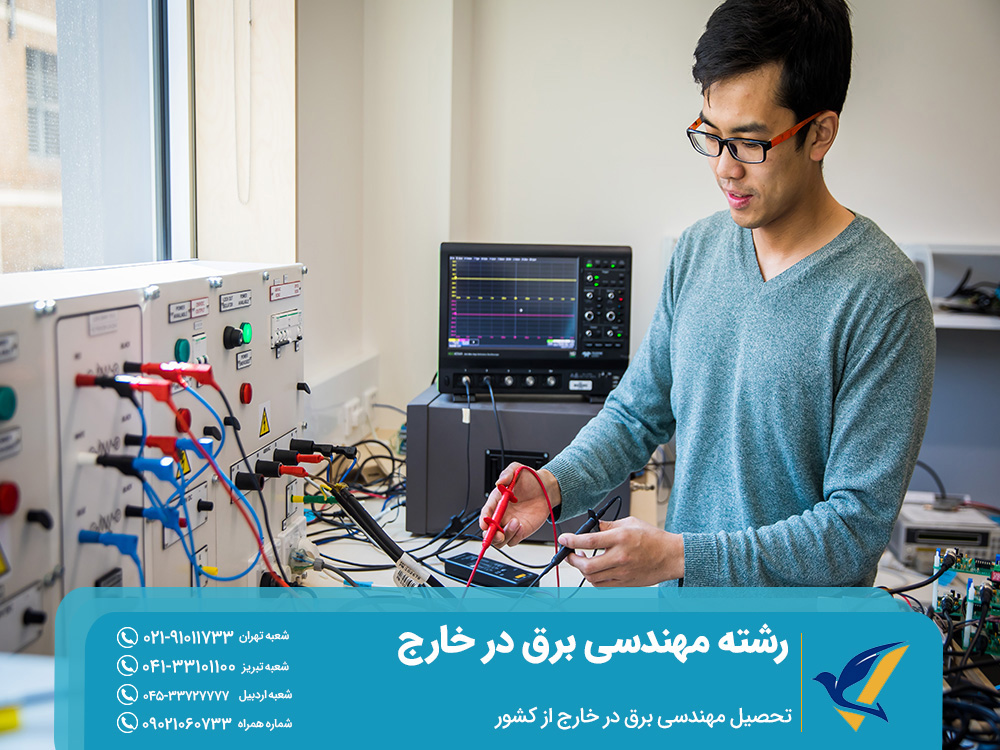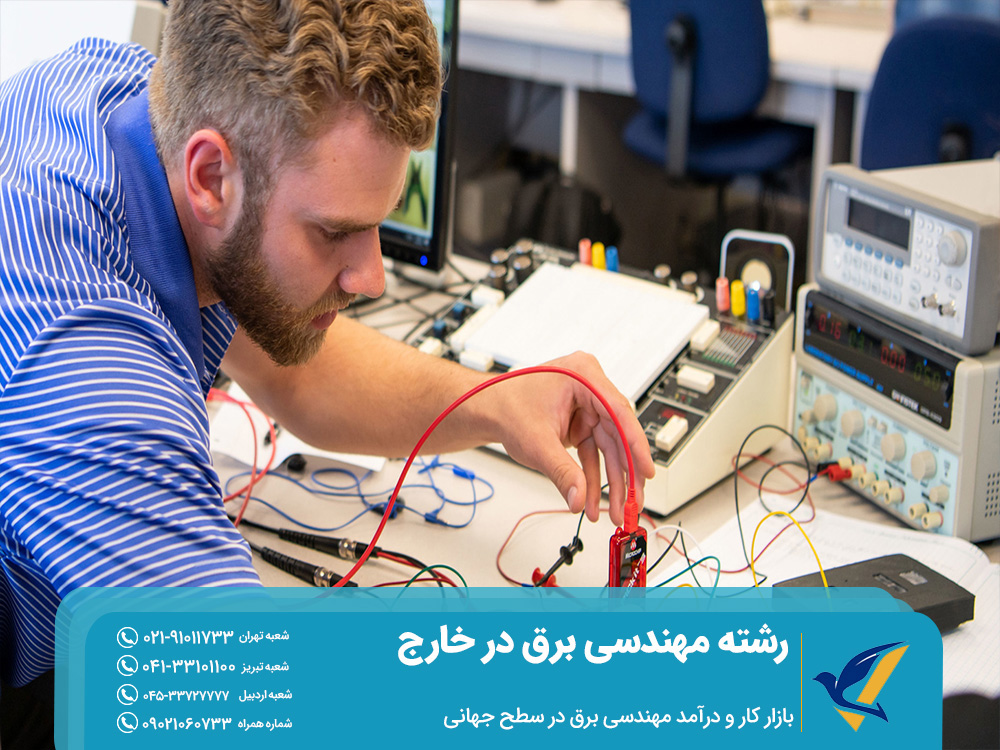Electrical Engineering Abroad
Electrical engineering is one of the most sought-after fields of study internationally. Given the rapid advancements in technology and the increasing demand for experts in this field, the opportunities to study electrical engineering abroad have become more attractive to students than ever before. The best electrical engineering universities in the world, such as renowned institutions like MIT, Stanford, and ETH Zurich, continually update their educational programs to stay aligned with industry needs and technological developments. According to the QS World University Rankings 2024, these universities remain at the top of the list for electrical engineering and electronics institutions. Studying electrical engineering abroad not only enhances specialized knowledge but also provides unique opportunities for international experience and exposure to the latest scientific and technological innovations. Additionally, as reported by IEEE (Institute of Electrical and Electronics Engineers), graduates from this field have some of the highest employment rates and average salaries among engineering disciplines. In this article from Elm Vira Migration Group, we’ll explore electrical engineering abroad and provide more insights into the conditions for studying this field internationally.
Introduction to Electrical Engineering
Electrical engineering is one of the most practical and versatile fields in modern science. It plays a crucial role in the development of communication infrastructures, energy systems, and cutting-edge technologies. Studying electrical engineering abroad provides an exceptional opportunity for students to learn in an advanced environment with state-of-the-art facilities. Some of the conditions for studying electrical engineering abroad include having a relevant bachelor’s degree and proficiency in English or the language of the destination country. Depending on the university and country, these conditions for academic migration may vary. The top electrical engineering universities in the world not only offer advanced curricula but also collaborate with leading industries, providing international students with various research and internship opportunities.

Studying Electrical Engineering Abroad
Studying electrical engineering abroad offers the opportunity to benefit from advanced education that aligns with the latest global technologies, while also experiencing different environments and cultures. The conditions for studying electrical engineering abroad vary depending on the country and university, but generally, you need to have strong academic qualifications and high grades. The best electrical engineering universities worldwide usually seek to attract talent that not only has strong theoretical knowledge but also unique thinking and problem-solving abilities. These universities provide international students with advanced resources and facilities, enabling them to turn their innovative ideas into reality and progress. Today, electrical engineering programs abroad focus on emerging and modern fields such as artificial intelligence, the Internet of Things, and smart systems, preparing students to lead the fourth industrial revolution. These educational programs at top universities combine academic knowledge and scientific experience through research projects and collaboration with leading industries. Furthermore, studying electrical engineering abroad offers international students the chance to become more familiar with global standards and approaches in electrical engineering.
Degree Levels in Electrical Engineering Abroad
Each degree level for electrical engineering abroad has its specific features and objectives, preparing students for different levels of expertise and responsibility in the field of electrical engineering. These programs are generally designed to guide students from fundamentals to the most advanced levels of research and development in electrical engineering.

- Associate Degree in Electrical Engineering
The Associate Degree in Electrical Engineering is a two-year program designed to solidify students’ knowledge and skills in the field. During this period, students are introduced to fundamental concepts such as electrical circuits, electronic systems, and engineering drafting. The curriculum of the Associate Degree in Electrical Engineering combines both theoretical and practical training. Students not only learn the basic principles in classrooms but also have opportunities to apply this knowledge in real-world projects through well-equipped laboratories. These practical experiences strengthen problem-solving skills and unique thinking, which are highly valuable in the job market. In addition to specialized courses, the program includes general education in subjects such as mathematics and basic sciences, providing a solid foundation for a deeper understanding of engineering concepts. Graduates of the Associate Degree in Electrical Engineering have a variety of career paths to choose from. Some enter the workforce as electronic engineering technicians, but the best option is to continue their studies at higher levels.
- Bachelor’s Degree in Electrical Engineering
The Bachelor’s Degree in Electrical Engineering abroad is a four-year program designed to prepare students for the complex and modern world of technology. This program offers a blend of in-depth theoretical education and extensive practical experiences. Throughout the course, students are introduced to a wide range of topics, including electrical circuit analysis, electrical networks, and engineering economics. The early years focus on strengthening scientific foundations with an emphasis on advanced physics and mathematics, while the later years focus on complex electrical engineering designs. One of the standout features of this degree is the emphasis on practical applications. Many programs include mandatory internships, allowing students to apply their knowledge in real industrial environments. These experiences not only enhance technical skills but also improve soft skills like teamwork and project management. Graduates of this program are faced with a variety of career opportunities in industries such as telecommunications, energy, automation, and electronics. Additionally, this degree provides a strong foundation for pursuing graduate studies. Many students continue their education at the master’s level, specializing in areas such as power systems, computer engineering, or signal processing.

- Master’s Degree in Electrical Engineering
The Master’s Degree in Electrical Engineering is a crucial stage in the process of specialization in this field. This program, typically lasting between two to three years, offers a unique opportunity for students to specialize in a particular area. During this period, students explore advanced topics such as electrical system modeling, protection of electrical systems, and risk assessment of systems. These courses not only increase specialized knowledge but also enhance analytical and problem-solving skills to a higher level. One of the key advantages of this program is the flexibility and diversity in choosing a specialized area. Students can focus on fields such as machine learning, biomedical engineering, power systems, or telecommunications, based on their interests and professional goals. This specialization creates unique job opportunities in various industries.
- Ph.D. in Electrical Engineering
The Ph.D. program in Electrical Engineering abroad represents the pinnacle of academic studies in this field, pushing students to the frontiers of knowledge and expertise. Typically lasting between five to six years, this program offers a rare opportunity to specialize and contribute to advancements in the scientific domain. During the Ph.D. course, students focus on specific areas such as computer engineering, software engineering, or modern fields like artificial intelligence and the Internet of Things. This specialization, combined with advanced research, prepares students to lead in innovation and technology. Doctoral programs in Electrical Engineering are a combination of advanced coursework, seminars, and research projects. Topics such as chip architecture, advanced energy system design, and complex signal processing algorithms are part of the curriculum. Additionally, the business and management aspects of advanced technologies are also examined, covering issues related to health, safety, and the financial aspects of electrical engineering companies.

Advantages of Studying Electrical Engineering Abroad
Studying Electrical Engineering abroad offers unique benefits for students that go beyond just theoretical education. These advantages help students grow not only academically but also personally and professionally, preparing them for leadership in the fields of innovation and technology.
- Access to Advanced Technologies and Modern Laboratories and Equipment
- Students can work with the latest technologies and equipment, which enhances practical learning experiences.
- Global Professional Networking
- Studying abroad provides the opportunity to build a global network with professionals and experts in the field.
- Cultural Experience
- Living and studying in a different country exposes students to new cultures, broadening their worldviews and enhancing personal growth.
- Extensive Research Opportunities
- Students gain the chance to collaborate on research projects with international industries and organizations.
- Familiarity with Global Standards
- Students are exposed to the latest global standards and practices in the field of Electrical Engineering.
- Improved Language Skills
- Living and studying abroad helps improve language proficiency, especially in English, which is essential in global engineering environments.
- Exposure to Innovative Teaching Methods
- Students benefit from advanced educational systems and modern teaching methodologies employed at top universities.
- Access to Extensive Resources
- Students have access to digital libraries, scientific databases, and advanced learning materials, which greatly enrich their studies.
Conditions for Studying Electrical Engineering Abroad
The conditions for studying Electrical Engineering abroad combine academic, skill-based, and language requirements to ensure students are well-prepared for success in this challenging field. These conditions can vary depending on the country and university. Some common conditions include:
- Strong Academic Foundation
- High grades in mathematics and physics courses.
- Standardized Test Scores
- Submission of standardized test scores such as SAT or ACT for undergraduate programs and GRE for graduate programs.
- Language Proficiency
- Proof of English proficiency through exams like TOEFL or IELTS.
- GPA Requirement
- A minimum GPA of 3.0 on a 4.0 scale.
- Practical Experience and Projects
- Internships, research projects, or extracurricular activities related to Electrical Engineering.
- Letters of Recommendation
- Two or three recommendation letters from professors or professionals in the field of Electrical Engineering.
- Financial Capability
- Proof of the ability to cover tuition and living expenses in the host country.
- It’s important for applicants to check the specific requirements of each university individually, as the conditions for studying Electrical Engineering abroad can vary depending on the institution, country, and even specific program.

Cost of Studying Electrical Engineering Abroad
In addition to the conditions for studying Electrical Engineering abroad, the cost of studying in this field is one of the most important factors for international students. As with the admission requirements, tuition fees can vary greatly depending on the country and university. In addition to tuition, students must also consider living expenses, which can differ based on the city and student lifestyle. The following are tuition fees for some of the top universities for Electrical Engineering worldwide:
UniversityTuition Fee
Stanford University $52,160 to $80,232 per year
University of California $33,071 per year
ETH Zurich 74 Swiss Francs (approx. $82) per semester
Harvard University $61,768 per year
University of Cambridge £39,162 (approx. $47,588) per year
EPFL (École Polytechnique Fédérale de Lausanne) 780 Swiss Francs (approx. $873) per semester
Top Scholarships for Electrical Engineering Abroad
Scholarships for Electrical Engineering abroad offer numerous opportunities for international students, not only covering tuition fees but also easing the conditions of studying in a foreign country. Some of the best scholarships for Electrical Engineering include:
- Fulbright Scholarship (USA)
- A highly prestigious scholarship for graduate studies in various fields of engineering, including Electrical Engineering.
- Erasmus Mundus Scholarship (Europe)
- This scholarship allows students to study at top European universities and is a fantastic option for those interested in Electrical Engineering.
- MEXT Scholarship (Japan)
- Offered by the Japanese government, this scholarship allows international students to study in Japan, one of the most advanced countries in technology and Electrical Engineering.
- University-specific Scholarships
- Many top universities worldwide offer their scholarships for outstanding students in Electrical Engineering. These often cover not only tuition but also provide access to advanced research facilities and internship opportunities.
These scholarships not only help financially but also offer additional benefits such as research access and internship opportunities, improving the overall experience for international students in Electrical Engineering.

Job Market and Salary for Electrical Engineering Worldwide
The job market and salary prospects for Electrical Engineering on a global scale are highly promising. With rapid technological advancements and the growing demand across various industries for experts in this field, Electrical Engineering holds a critical position. Countries like Canada, Switzerland, Australia, and the United States are among the best destinations for electrical engineers, offering not only ample job opportunities but also high salaries. For instance, the annual income of an electrical engineer in Australia can exceed $137,000.
Countries like Germany, the UK, and Japan not only provide high-quality education in Electrical Engineering but also offer advanced research facilities to students. These ideal academic conditions, combined with the strong job market in countries like New Zealand, India, and China, make studying and working in Electrical Engineering abroad one of the best options for international students.
Top Electrical Engineering Universities Worldwide
Electrical Engineering holds a prestigious place globally, and university rankings show that these institutions offer advanced educational programs to international students. Among the best Electrical Engineering universities globally, the Massachusetts Institute of Technology (MIT) in the USA ranks first. Along with Stanford and the University of California, MIT represents the leading institutions in the field of Electrical Engineering in the United States.
In Europe, ETH Zurich in Switzerland and the University of Cambridge in the UK rank fourth and fifth, respectively, in global rankings, illustrating that Electrical Engineering education in Europe is also of high quality. Additionally, Swiss universities like ETH Zurich and EPFL (École Polytechnique Fédérale de Lausanne) are excellent options for international students, with top global rankings. In Asia, Nanyang Technological University and the National University of Singapore, ranked ninth and tenth globally, have made significant strides in Electrical Engineering education.
This geographical diversity among the top-ranked universities provides international students with a broad range of opportunities to study Electrical Engineering abroad, further enhancing the global appeal of the field.

Electrical Engineering in China
Electrical Engineering is highly regarded in China, a country that has become one of the world’s technology hubs, offering excellent educational and career opportunities for students in this field. One of the key advantages of studying in China is the relatively low cost of education. Despite the high-quality education provided at top-tier universities, the costs are much more affordable compared to Western countries, making China an attractive destination for international students interested in Electrical Engineering.
Additionally, the credentials issued by reputable Chinese universities are widely recognized, allowing graduates to pursue further studies or work in other parts of the world. Another notable benefit is that most Chinese universities do not require entrance exams for international students, simplifying the admissions process. In terms of career prospects, statistics show that graduates with a master’s degree in Electrical Engineering in China earn significantly higher salaries (approximately 93% higher) compared to graduates from other fields like law. This highlights the value and demand for Electrical Engineering professionals in the Chinese job market.
Top Chinese Universities for Electrical Engineering:
- Tsinghua University
- Peking University
- Shanghai Jiao Tong University
- Zhejiang University
Electrical Engineering in Turkey
Electrical Engineering is a popular field of study in Turkey, particularly among international and Iranian students. Several factors contribute to this popularity, including geographical proximity, cultural similarities, and promising career prospects. One of the key advantages of studying Electrical Engineering in Turkey is the opportunity to secure high-paying jobs, not only in Turkey but also in American and European countries. This is due to the specialized knowledge and skills that students gain during their studies.
The requirements for studying Electrical Engineering in Turkish universities can vary depending on the institution, allowing students to choose universities that best fit their conditions and abilities. An important aspect of studying this field in Turkey is the option to study in either Turkish or English, depending on the university.
Tuition fees for Electrical Engineering programs in Turkish universities vary significantly depending on the institution and level of study. For instance, the annual tuition fee for Electrical Engineering at MEF University ranges from $2,746 to $25,269. Studying Electrical Engineering in Turkey provides an ideal opportunity for students looking for a nearby country with relatively affordable tuition and strong career prospects. Additionally, Turkey’s strategic location between Europe and Asia offers graduates many employment opportunities.
Top Turkish Universities for Electrical Engineering:
- MEF University, Istanbul
- Medeniyet University, Istanbul
- Bilkent University
- Sabancı University

Electrical Engineering in Russia
Studying Electrical Engineering in Russia is an excellent choice for international students looking to pursue higher education and immigration opportunities. Russia has made continuous advancements in technology, creating a strong demand for skilled professionals in electronics and smart devices, making it an ideal place for Electrical Engineering graduates.
One of the key benefits of studying in Russia is the potential for high earnings and salary increases based on experience. Russian universities are renowned for their high-quality education in technical fields and offer diverse programs in Electrical Engineering. These programs cover various specializations such as electronics, power engineering, control systems, telecommunications, and biomedical engineering.
Another advantage of studying Electrical Engineering in Russia is the option to study in either Russian or English, providing more flexibility for international students. In terms of affordability, studying in Russia is cost-effective. The average tuition fees for Electrical Engineering range from $2,000 to $5,000 per year, which is considerably more affordable compared to many Western countries. Additionally, there are opportunities for scholarships and student employment, which can help reduce the financial burden.
Moreover, many Russian universities are recognized by Iran’s Ministry of Science, enabling graduates to return to Iran and find employment there.
Top Russian Universities for Electrical Engineering:
- Bauman Moscow State Technical University
- Novosibirsk State Technical University
- Saint Petersburg State University
Conclusion
Studying Electrical Engineering abroad offers unparalleled opportunities for students to learn at some of the best universities in the world, equipped with state-of-the-art technology and advanced facilities. The study programs are updated to meet the demands of the job market and technological advancements. Many top universities offer diverse programs that cater to various specializations in Electrical Engineering.
Additionally, various scholarships are available to international students, which can significantly reduce tuition costs and provide more opportunities for those wishing to study abroad. These scholarships are offered by universities, governments, and other organizations, helping students focus on their studies and research without financial concerns.
Choosing Electrical Engineering as a field of study abroad not only invests in one’s future career and academic development but also provides an opportunity to experience new cultures and expand international exposure. At Elm Vira Immigration Institute, we help you secure free admission to top universities and provide one year of free support on your study abroad journey. For more information on study abroad opportunities and to receive a free consultation, visit our free advisory section.
میانگین امتیازات 5 از 5
Vote count: 1 Vote